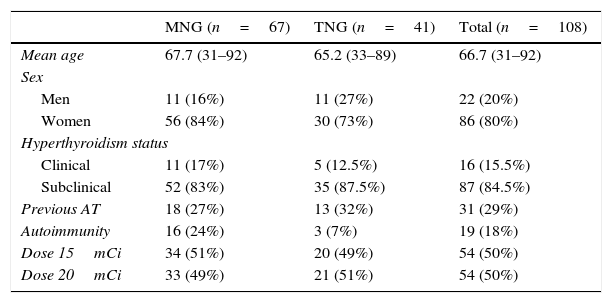To assess the outcome after 131I treatment in patients with multinodular (MNG) and nodular toxic goitre (NTG) according to the administered dose (555 or 740MBq) and other factors related to the patient, pathology, or previous treatments.
Material and methodsA retrospective study was conducted on 108 patients (67 MNG and 41 NTG) treated in our department, with a follow-up period of at least 2 years. Development of hypothyroidism and treatment failure were evaluated along with their relationship with the administered dose and other factors such as age, sex, grade of hyperthyroidism, type of goitre, presence of autoimmunity, or previous antithyroid medication.
ResultsMore than one-third (36.9%) of MNG patients, and even higher proportion of NTG patients (51.2%) developed non-transient hypothyroidism, particularly in those receiving 740MBq (66.7%). No relationship was found with any other variable. The development of early hypothyroidism (before one year) was also not related to any variable. Treatment failure was not related to the dose, but in MNG there was a relationship with male gender, presence of autoimmunity, or previous antithyroid drugs use.
ConclusionsThe high rate of hypothyroidism obtained with high doses of 131I in hyperthyroidism secondary to nodular goitre treatment suggests that lower doses might be sufficient to control the disease without an increase in treatment failures. Only patients with positive autoimmunity, in previous anti-thyroid medication, and perhaps male gender in MNG might be given higher doses, as the failure rate increases, but further studies are required.
Determinar el resultado obtenido tras tratamiento con 131I en pacientes con bocio multinodular (BMN) y nódulo autónomo tóxico (NAT) en función de la dosis administrada (555 o 740 MBq) y de otros factores relacionados con el paciente, la enfermedad o tratamientos previos.
Material y métodosEs un estudio retrospectivo sobre 108 pacientes (67 BMN y 41 NAT) tratados en nuestra unidad y con un seguimiento mínimo de 2 años. Se valoró el desarrollo de hipotiroidismo y el fracaso del tratamiento así como su relación con la dosis administrada u otros factores dependientes del paciente (edad o sexo), de la enfermedad (autoinmunidad, grado de hipertiroidismo o tipo de bocio) o la toma previa de antitiroideos.
ResultadosEl 36,9% de los pacientes con BMN desarrollaron hipotiroidismo no transitorio llegando al 51,2% en el caso de los NAT y sobre todo en aquellos que recibieron 740MBq (66,7%) sin encontrarse relación con ninguna otra variable así como tampoco en el desarrollo precoz del hipotiroidismo antes de un año. El fracaso del tratamiento no tuvo relación significativa con la dosis administrada pero sí con el sexo varón, la presencia de autoinmunidad o la toma previa de antitiroideos en el caso de los BMN.
ConclusionesLa elevada tasa de hipotiroidismo obtenida con dosis altas en el tratamiento de hipertiroidismo en el bocio nodular indica que dosis más bajas podrían ser suficientes para controlar la enfermedad sin producir un aumento de fracasos del tratamiento. Únicamente en los pacientes con BMN de sexo masculino, con autoinmunidad positiva o toma previa de antitiroideos se podría estudiar la posibilidad de administrar una dosis mayor pues tienen una tasa de fracasos más elevada.
Article

Revista Española de Medicina Nuclear e Imagen Molecular (English Edition)










